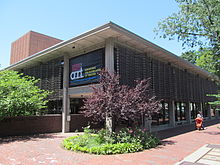American Repertory Theatre

Loeb Drama Center
|
|
| Address | Loeb Drama Center 64 Brattle Street OBERON 2 Arrow Street Cambridge, Massachusetts United States |
|---|---|
| Coordinates | 42°22′29.84″N 71°7′21.54″W / 42.3749556°N 71.1226500°WCoordinates: 42°22′29.84″N 71°7′21.54″W / 42.3749556°N 71.1226500°W |
| Type | Regional theater |
| Capacity | Loeb Drama Center: 556 |
| Years active | 1980 to present |
| Website | |
| www |
|
The American Repertory Theater (A.R.T.) is a professional not-for-profit theater in Cambridge, Massachusetts. Founded in 1980 by Robert Brustein, the A.R.T. is known for its commitment to new American plays and music–theater explorations; to neglected works of the past; and to established classical texts reinterpreted in refreshing new ways. Over the past thirty years it has garnered many of the nation's most distinguished awards, including a Pulitzer Prize (1982), a Tony Award (1986), and a Jujamcyn Award (1985). In December 2002, the A.R.T. was the recipient of the National Theatre Conference's Outstanding Achievement Award, and in May 2003 it was named one of the top three theaters in the country by Time Magazine. The A.R.T. is housed in the Loeb Drama Center at Harvard University. The A.R.T. houses the Institute for Advanced Theater Training at Harvard University and the Harvard-Radcliffe Drama Club.
In 2002 Robert Woodruff replaced founder Robert Brustein as the A.R.T.'s Artistic Director. After Woodruff's departure in 2007, Associate Artistic Director Gideon Lester took the reins for 2008-09 season, and in May 2008 Diane Paulus was named the new Artistic Director. Paulus, a Harvard alum, is widely known as a director of theater and opera. Her work includes The Donkey Show, which ran off-Broadway for six years; productions at the Chicago Opera Theatre; and the Public Theater's 2008 production of Hair, which won the Tony Award for Best Revival of a Musical.
The appearance of the American Repertory Theater at Harvard in 1979 was a groundbreaking event and an unusual act of faith by the administration. It represented the establishment of the only permanent professional arts organization on campus. The ART was also responsible for the first undergraduate credit courses in theatre in Harvard history-in acting, directing, and dramaturgy, given by professional members of the company with teaching experience. These are offered and accepted on the assumption that the best teachers in any artistic field are its practitioners. In the 1920s George Pierce Baker gave his celebrated 47 Workshop Playwriting course at Harvard as an elective in the English department. Baker's dramatic instruction was effective enough to attract the likes of Eugene O'Neill, Philip Barry, and S.N. Behrman to Cambridge. But when Baker requested a space in which to stage scenes from the plays of his students, the administration balked. A wealthy donor from the Harkness family thereupon offered Harvard what was then the munificent sum of a million dollars to build a theatre and a drama department for Baker. In one of the few such actions in its long history, Harvard turned down the bequest. Baker took the money to Yale where he founded what was soon to be called the Yale School of Drama. The American Repertory Theater came to Harvard from Yale in 1979. One of the reasons for the coming of the American Repertory Theater (ART) to Harvard, and Robert Brustein's appointment as director of the Loeb, was to help improve the quality of Harvard-Radcliffe Drama Club (HRDC) shows on the main stage, partly through practical courses in the craft of acting and directing, partly through professional guidance of HRDC production.
...
Wikipedia
